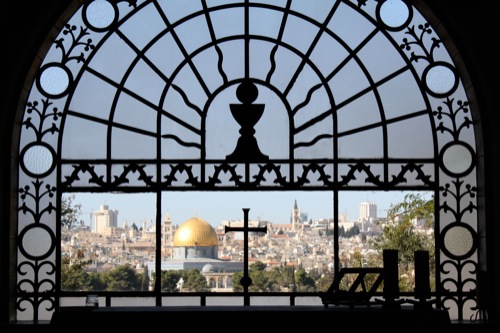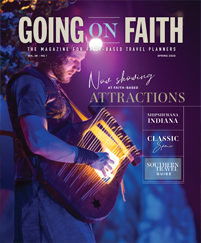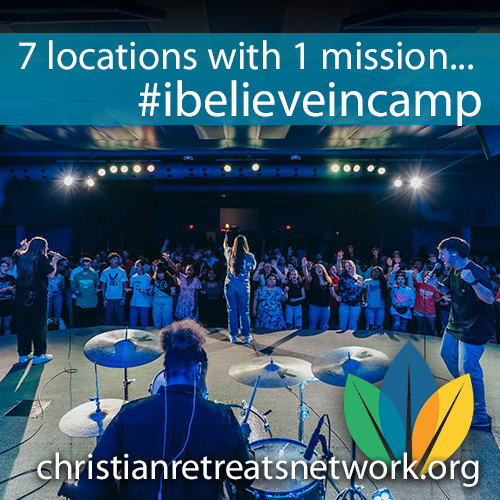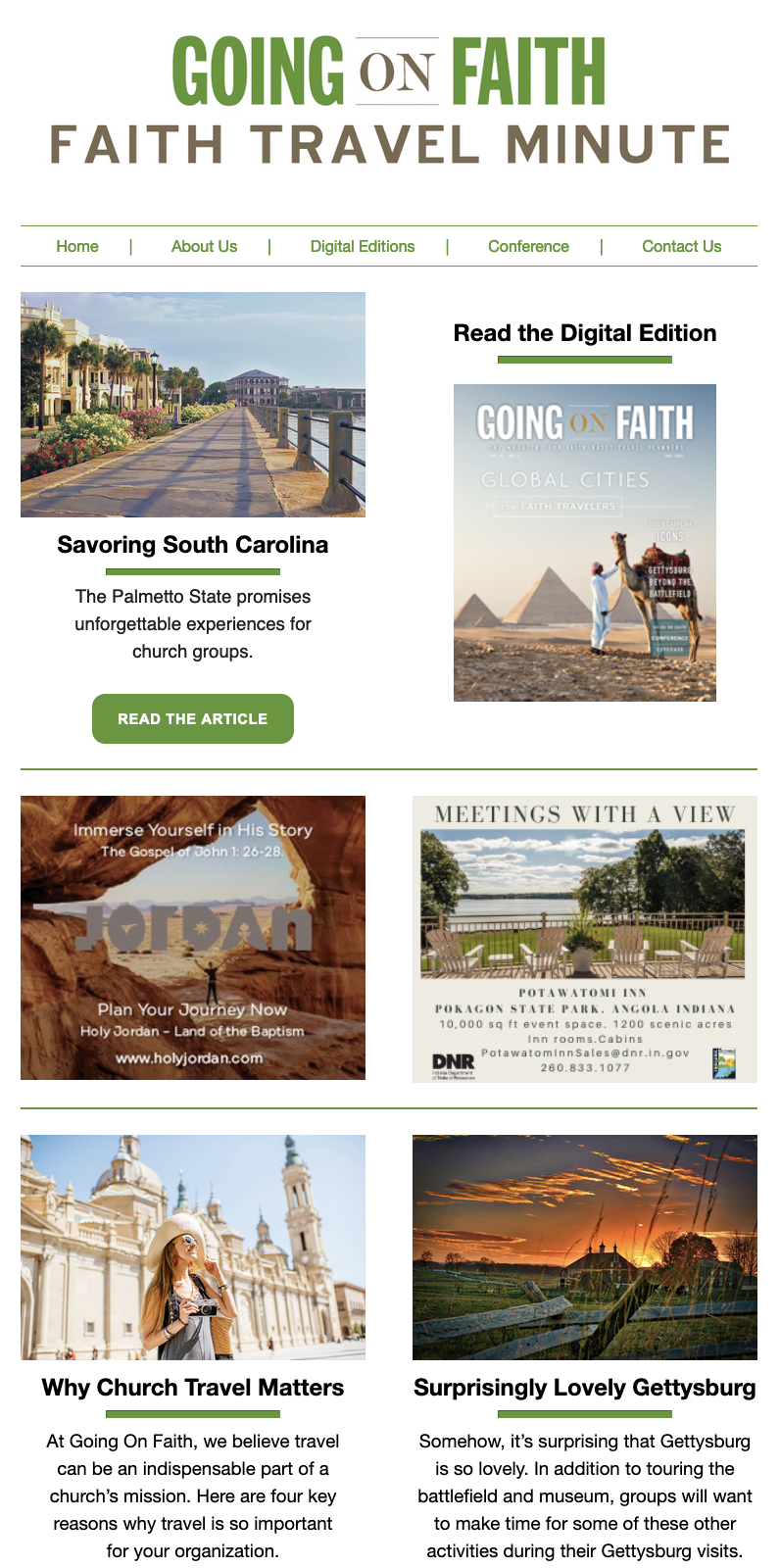
Church travel takes on new dimensions when groups explore destinations for their spiritual significance. Place becomes a vehicle for growth and challenge. Trips to spiritually significant places, ranging from traditional Catholic pilgrimages to Holy Land adventures and Protestant tours in Europe, can be some of the most memorable experiences in your travelers’ personal faith journeys.
Operators of a variety of faith travel companies and pilgrimage leaders all agree that greater insight into the Scriptures and a renewed faith are benefits from any trip that focuses on the Word of God.
Spiritual travel defined
In a nutshell, each company wants to encourage believers through Bible-based or church history-inspired travel. For a Christian to walk where Jesus walked or view firsthand the places where heroes of the faith lived and died is an enlightening experience.
“It’s an opportunity to walk in the steps of Jesus and the apostles and study the Scriptures,” said Pilgrim Tours president David Nyce. “When you’re actually at a destination and look at the Scriptures in that context, it’s a whole different dimension of study. Emotions and senses are involved. It adds new life to our understanding of who God is and what he’s done for us. There’s nothing like it.”
Tours include the latest archaeological discoveries that support the Bible: Herod’s grave, recently found near his palace outside Jerusalem; a full-size Roman statue washed up on the beach in Caesarea; a tablet shard carved in the second temple period, discarded from a recent Arab dig under the temple mount.
“The Scriptures themselves are the guidebook to Israel,” said Larry Ritter, president and owner of Christian HolyLand Tours. “A trip to the Holy Land allows for a deeper understanding of our faith.”
Joe Aquilante, Catholic theology teacher and experienced youth pilgrimage leader from Philadelphia, said he sets the tone of the trip by using the term “pilgrimage.” His trips incorporate fun and adventure, but students also expect to grow in their personal faith.
“It’s a whole new dimension,” said Aquilante. “For instance, at Mont-St. Michelle, we take time to sit and pray and meditate after we climb to the cloister at the very top of the cathedral.”
Tour logistics
Pilgrim Tours caters primarily to the Protestant, evangelical market, and their itineraries include sites of noteworthy devotional and scriptural significance, as opposed to simply holy sites.
“Our guides are mostly believers, whether in Greece or Israel,” said Nyce “They are wonderful at bringing Scriptures to a devotional conclusion and then turning it over to pastors who travel with us and also teach.”
Reformation Tours also targets the Protestant niche and likes to prepare people with ample information before each trip. Each tour has a host, usually a pastor or bible college director, someone comfortable with building a group and leading devotions. Together, the company and host design an itinerary. The company provides a free Web page, brochures, DVDs and any support needed. Once the group arrives, bilingual tour guides handle the operations and accompany the group from beginning to end.
“Our goal is to combine learning about people’s Christian heritage with an excellent vacation,” said Rowena Drinkhouse, vice president of Reformation Tours.
Christian HolyLand Tours designs trips based on the expectations of clergy. The lead pastor ministers and teaches, but is aided by a Christian tour guide and an Israeli who helps lead the group.
“Every Israeli guide has a wealth of personal stories. Each has fought in a war or battle because every mature Israeli has served in the military,” said Ritter. “Many are professors at the Hebrew University, and all are well educated.”
Standout itineraries
In the Holy Land, days and nights are filled with destinations centered on Christ and biblical events. Christian HolyLand Tours books many seven- and nine-day excursions that offer the option of home hospitality at the Sea of Galilee or a stay on a modern, Orthodox kibbutz.
“On the kibbutz, guests enjoy Jewish hospitality and experience living off the land since many in the community still farm and herd sheep,” said Ritter. “Tours highlight both historic and modern Israel. Our popular, 10-day Exodus program adds Egypt and Jordan. Interfaith tours that combine the Jewish and Christian faith are quite popular.”
Pilgrim Tours looks at the area and studies the history of the Bible. “We visit to have a better understanding of our Lord and what he’s done for us,” said Nyce. “We see the scenery, but our primary purpose is to understand God and glorify him more.”
Primarily booking to Europe, Reformation Tours allows for a continuum of preferences. Family oriented trips include the cultural along with the spiritual. Bible college groups obtaining course credit pack in as much as possible; and church groups build in cultural activities and free time.
An average trips lasts 12 days, and Germany is the company’s most popular destination.
Luther-Bach tours remain strong, since many are fascinated by the music, and the sites are intertwined geographically. Next is the United Kingdom, with England’s Methodist heritage and Scotland’s Presbyterian history. Switzerland, Turkey and Greece follow closely behind.
“In Germany, we might include a Rhine cruise, visit Bavarian castles or schedule a cooking class,” said Drinkhouse. “However, we can customize exactly what groups prefer. On one Presbyterian tour to Scotland, we brought in speakers at different locations based on specific requests of the lead pastor.”
Enhancing church ministry
Pastors spend concentrated time with members of their congregation and bonds deepen; group members connect with each other and with the Lord. For larger churches, Ritter explains that a group might work through a particular study, maybe on Paul or Revelation, and travel afterward.
“Trips are a completely different way to study the Scriptures, and the way people understand Scripture is completely different after one of our trips. To be able to learn and have fellowship in the Holy Land with other believers is a tremendous, personal growth experience,” said Nyce. “This kind of trip changes people’s lives drastically and causes them to be more tied into the pastor and his message. They develop a relationship with him as leader of the group.”
Drinkhouse agrees that trips fill an important role for fellowship. Travelers participate in daily devotional time and pray together, most often led by their pastor.
“On our European trips, groups hear amazing stories about their Christian heritage. We wouldn’t be reading the Bible in English without the sacrifice of those who went before,” said Drinkhouse. “Travelers visit places where believers made a profound difference, and it encourages them to come home and do the same.”
Ritter added, “It’s like a mission trip, but people come back with a greater understanding of the Scriptures and a deeper relationship with the pastor, church members who were fellow travelers and the Lord.”
Aquilante couldn’t agree more: “Faith-based travel breathes a whole new dimension of adventure into a young Christian’s life. Ultimately, they learn how to take Christ with them wherever they go.”










